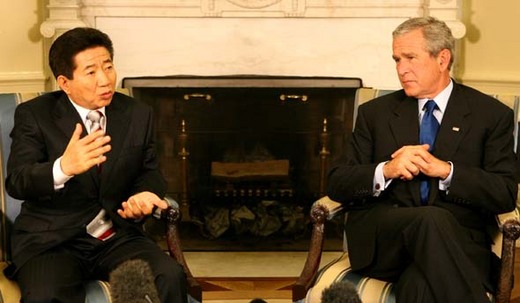 |
"My message to the Korean people is that the United States is committed to the security of the Korean Peninsula," Bush said. Roh acknowledged that to the U.S., North Korea ranks among many global concerns that include Iran and the Middle East, and yet Seoul and Washington are working closely on North Korea. "I believe this is the important point, that this is in fact very meaningful that the United States is devoting much of its efforts to resolving the North Korean issue," he said through an interpreter. The summit opened against a backdrop of wide-ranging challenges and changes to an alliance dating back to the 1950-1953 Korean War, when the U.S. and South Korea fought against an invasion from the North. Some 30,000 American troops are still stationed in the South mainly as a deterrent against the North. Pyongyang now poses another challenge as it wields missiles and nuclear weapons. In July, it test-fired seven ballistic missiles, including a long-range Taepodong that, in theory, can reach the U.S. west coast. The U.N. Security Council unanimously adopted a resolution condemning Pyongyang's actions and urging U.N. members to step up vigilance against transferring funds or material to North Korea that might help missile or weapons of mass destruction programs. The missile tests came as the international community was trying to bring the North back to the six-party talks, a forum involving South and North Korea, the U.S., China, Russia and Japan aimed at denuclearizing the Korean Peninsula. The talks were last held in November. "As for the question about the common and broad approach being talked about between our two countries for the restart of the six-party talks, I must tell you that we are at the working level of consulting very closely on this issue," said Roh. South Korea's chief security adviser, Song Min-soon, told reporters that talks are already under way and meetings are scheduled next week to go into more specifics. "The presidents were briefed on what the proposals are and how related parties are consulting them," Song said. "There was an agreement today to actualize the proposals." At the White House, spokesman Tony Snow said Bush had reiterated his commitment to a diplomatic resolution of the North Korea nuclear dispute. Yet, the UNSC resolution leaves options open for sanctions against North Korea, should the country pose threats to international peace. U.S. officials have publicly been saying that they are reviewing follow-up steps to the resolution, suggesting such measures would soon be taken. But the South Korean president said it is premature and inappropriate to talk about such measures, which presume the six-party talks would fail. "As for South Korea, because of future inter-Korean relations, we hesitate to use the word sanctions," Roh said. He said Seoul's decisions to suspend rice and fertilizer assistance to Pyongyang after the July missile tests were tantamount to sanctions. "I don't think we are at a stage to talk anew about sanctions," said Roh. Song said in his briefing that sanctions did not come up in the presidents' talks. Thursday's summit precedes a high-level defense conference next month in which the two countries will announce a road map to new military arrangements reflecting a bigger role for South Korea in its national defense. One focal point in this discussion is the wartime operational control of South Korean forces, which currently rests with a U.S. commander. Seoul and Washington agree that the control should be transferred to the South Korean side but disagree on the timing. Seoul wants it in 2012, but Washington proposes 2009. Both Roh and Bush warned against military arrangements turning political. "... We agreed that this is not a political issue. This is an issue that will be discussed through the working level talks and we will continue to work together on this issue," said Roh. "I agree with the president that the issue should not become a political issue," Bush said, indicating he knows about the heated debate within South Korea spurred by those who argue against such a transfer. "I have talked to our secretary of defense about making sure that the issue is done in a consultative way and at the appropriate level of government," he said, "and that's how we will end up deciding the appropriate transfer of operational authority." The two presidents also discussed the FTA in depth, Snow said. "They had a long conversation, both in the session and more so in the luncheon, about a free trade agreement," he said. Song said Roh prioritized content over deadline but wanted to see the talks progress quickly. The South Korean leader also mentioned his country's inclusion in the visa waiver program, which would allow South Korean nationals to visit and stay in the U.S. up to 90 days without visas. "I assured him we will work together to see if we can't get this issue resolved as quickly as possible," said Bush. Roh wrapped up his three-day Washington visit with a meeting with U.S. opinion leaders, including former Secretary of State Madeleine Albright and former National Security Adviser Samuel Burger. A press release from Roh's office said the president explained his North Korea policy and pending agendas under negotiation between Seoul and Washington. Roh was to leave for San Francisco later in the day, his last stop before returning to Seoul. Washington, Sept. 14 (Yonhap News)






